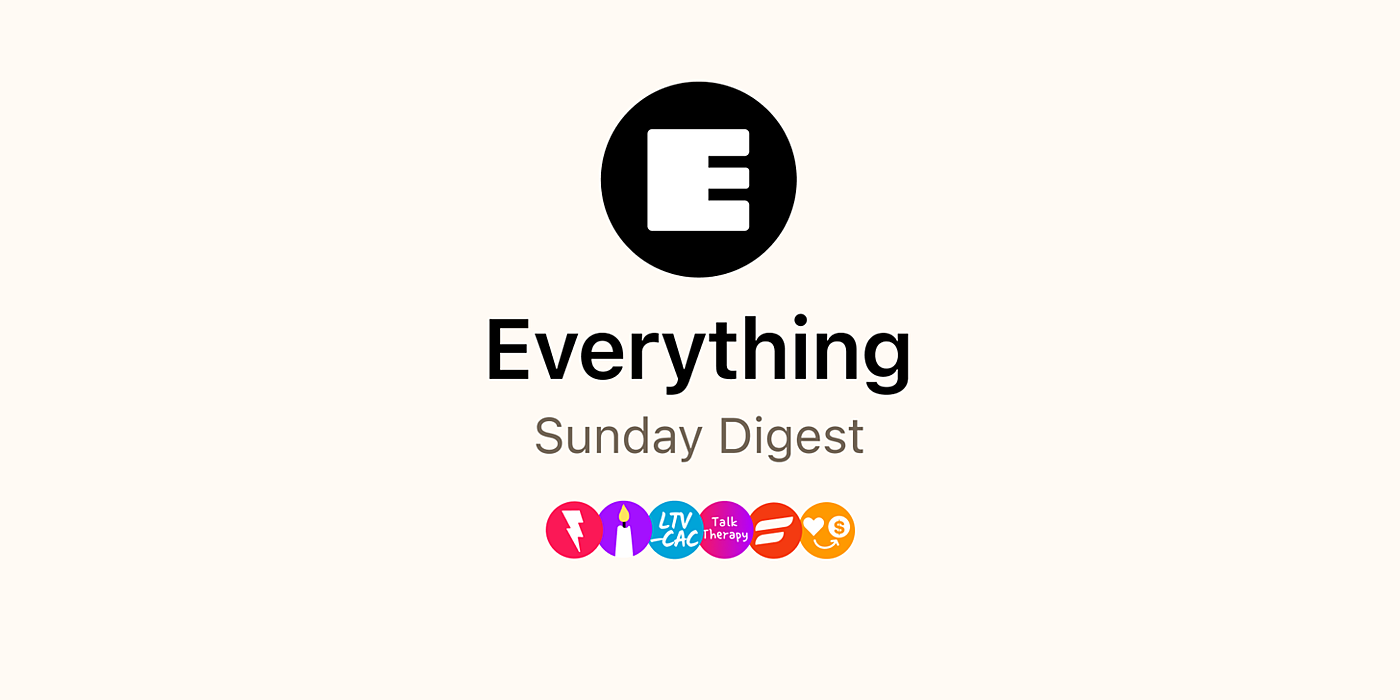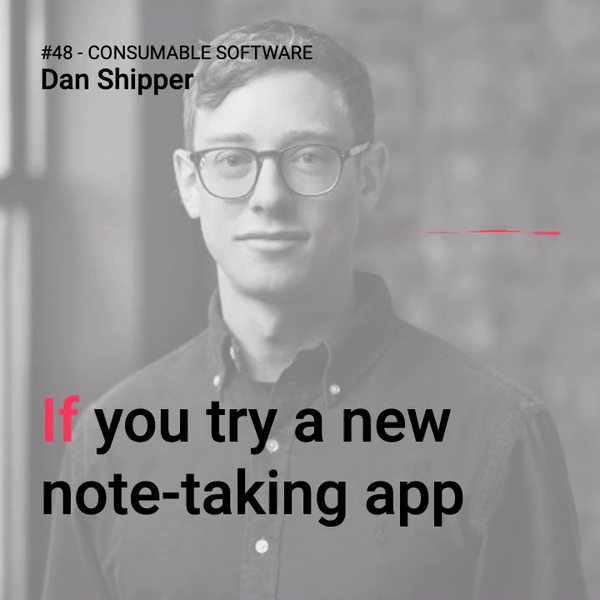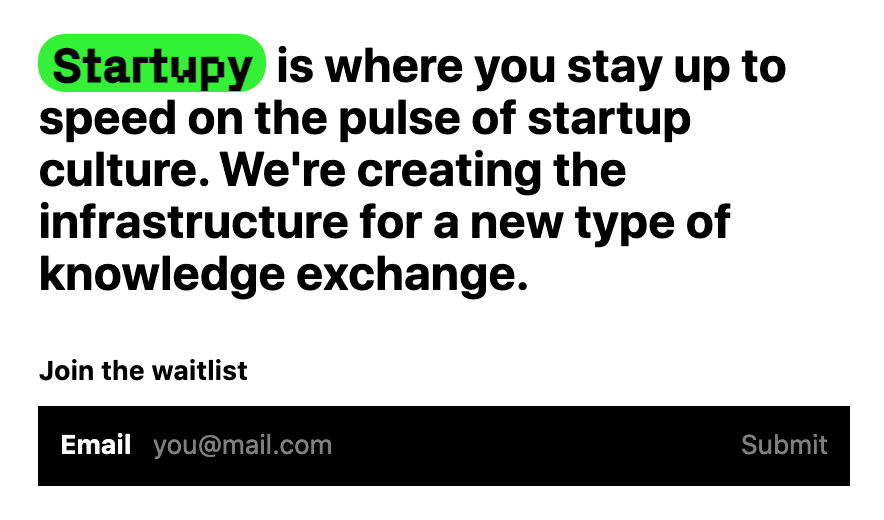
The Sunday Digest: Break it up!
Everything we did this week, plus: Startupy, Disney+, & the subscription boom
December 13, 2020
Happy Sunday!
Curious about that headline? Maybe you, like us, caught wind on Wednesday of what the FTC wants to do to Facebook. But we’re thinking more of the question we asked readers this week: How do you give yourself a break?
Responses ran the gamut of personal go-to’s in a year of upturned expectations: Seasonal Spotify playlists; VR bowling; reviewing a year’s worth of journal entries. Unwinding, in a word. Letting the tension flow out. Booting down, if you will.
There’s another way to pose this question, though: How—literally, how—do we go about giving ourselves the proverbial Break? What’s the game plan?
If there’s one thing we tried to answer across the bundle this week, that’s it. Our own responses careened between the sweet spots of the newsletters they came from: Applying behavioral therapy to productivity. Fighting loneliness by reading everything you can. Refusing to judge yourself for flitting between softwares. And if those examples seem like a stretch, we also ran a communal game of Among Us. Seriously—Everything bundle writers got together on Wednesday night and played our hearts out. It was extremely fun…and it turns out you shouldn’t let Austin Langlinais out of sight for a second.👀👀👀
We wrote about plenty more, of course—from live-streaming and developer communities to passion economy news and the week in strategy. So sit down and dig in; you might even find that you’ve given yourself a break somewhere along the way.
What We Published
The lowdown on this week’s output, including 6 articles, 2 podcasts, and 2 live conversations.
⚡️ Cognitive Behavioral Productivity
by Jonathan Shi in Superorganizers
With this dive into modern psychology, Jonathan Shi explains why often get in our own way when it comes to productivity: We overuse tools of control when it comes to our feelings of procrastination and burnout, and that ends up making things worse rather than better. Moving between various tools in psychology, the piece offers an alternative approach to unblocking yourself: behavioral therapies.
🔒Read (8 minutes)
🕊 Follow Your Curiosity. Read Your Ass Off.
by Andy Sparks with Jerry Colonna in Ask Jerry
Asked where his inspiration comes from, Jerry’s answer is simple: it’s the title of this post. The key to true exploration and inspiration, he’s learned, is following curiosity to your sources—and then tracing those texts to their own sources. That method is the foundation of his understanding of everything from Buddhism to psychology, but it isn’t just about locating what you’re looking for. It’s about reading so much that you find things you didn’t realize you needed to know.
Read (5 minutes)
📚 The Problem with Retirement Funds
by Nat Eliason in Almanack
Nat’s not huge on conventional wisdom—especially when it comes to saving money. In this case, he sets his sights on retirement funds, the endpoint of a lot of contemporary financial advice. Questioning the ROI of early investment in funds and weighing the benefits of Slow vs. Sudden wealth, he makes a convincing case for “investing in ourselves.” Check out Nat’s latest to find out what exactly that looks like.
🔒Read (10 minutes)
💝 News Roundup #12: YouTube Revamps Premieres & A New Player in Local Newsletters
in Means of Creation
One of the best things about MOC—besides its killer roster of webinar guests and the community Discord—is that the Weekly Roundup manages to keep a laser focus on the passion economy while covering a wide field of topics in each installment. This week’s set of takes from Li and Nathan covered YouTube’s response to the pandemic-era growth of its livestream feature, the launch of local-newsletter platform Patch Labs, and Stir’s MerchWith, and how college cheerleaders are monetizing their social capital. The range!
🔒Read (5 minutes)
Head over to the MOC YouTube page tomorrow for a recording of Li and Nathan’s conversation with Substack Head of Writer Experience Nadia Eghbal!
🔮 Three Shorts: Why AT&T is betting the farm on HBO Max
by Nathan Baschez in Divinations
This week’s shorts were delicate, sturdy, and just plain soothing. Nathan offers bulleted analysis on Warner Bros.’ unprecedented streaming pivot, Amazon’s low-stakes but well-advised podcasting acquisition, and the future of guided-meditation app Calm after a $2B valuation.
🔒Read (6 minutes)
📐 How Live-streaming Ecommerce Works in China
by Yiren Lu and Grace Zhang in Napkin Math
Returning with the latest on tech in China, Yiren and Grace drill down on the national phenomenon of livestreamed e-commerce—or, as they put it, the combination of “two eminently addictive behaviors: livestreaming and online shopping.” QVC meets Twitch only scratches the surface, so read on for how live eCom works, who hosts and watches it, why the Chinese government is adopting it as a strategy, and when the U.S. might expect something like it, too.
🔒Read (6.5 minutes)
💞 #48 - Consumable Software & #49 - On Stress 🎧
on Talk Therapy with Dan Shipper and Nathan Baschez
It was a good week for honesty on Talk Therapy. First, there was a problem: why can’t I stick with one piece of software? But as Nathan talked it through with Dan, it became clear that changing your tools isn’t so different from changing your workspace—and of course, these days, one of those is a little easier to do.
Next, they wondered: why are humans uniquely good at stress? In exchanging takes drawn from their own experiences with stress anxiety, Dan and Nathan agreed that simply recognizing stress is as important as solving it—and that sometimes, trying to make things better without a plan can be part of the problem.
Listen: #48 (12 minutes) and #49 (15.5 minutes)
TLC Returns!
After a two-week hiatus, Rachel and the gang reconvened on Friday to talk about their early-winter writing and editing experiences and Helen Keller’s autobiography. The podcast will be up tomorrow, but in the meantime, make sure to sign up for this week’s Long Conversation (and the last one of 2020): The Body Question. We’ll be bringing together our previous discussions of the body’s role in writing and learning, through an exercise and a brief reading that will lead us to consider how embodied writing can be a stay against isolation and a push toward community.
What’s Going On
Startupy clears its throat
This week saw the launch of an exciting new hub for knowledge and information about startups. With a website divided into four sections (Information, Context, Thinking, and Analysis) Startupy promises to give funders and creators alike the materials they need to understand the startup sphere better—and recognize the writers behind that information in the process. Nathan, for one, is into it:
Ever since I was working on my previous company, Hardbound, I’ve been in love with experimental forms of storytelling. The pitch for this cool new community is such a refreshing change of pace from the same old text box that everybody writes in. I love it.
Disney takes things up several notches
If you didn’t already spend Thursday night losing your mind over the Disney+ event announcing a wildly deep slate of shows and a whole new service, you’ve likely heard something about it by now. Many, like Matthew Ball, were awed by the show:
https://twitter.com/ballmatthew/status/1337394353036283905
Others are wary. There’s also a good, even-keeled piece at The Verge, describing the announcement as a “brute show of power.” Whether you’re rabid for the flurry of Star Wars shows we’re about to get or dreading the necessity of adding a new subscription, we can probably agree that this has been a wild month for the Streaming Wars.
More News
- Oracle Moves Headquarters to Texas, Joining Valley Exodus
- Substack is Building a Reader App
- Uber sells self-driving unit Uber ATG in deal that will push Aurora’s valuation to $10B
What We’re Reading
When Products Become Services
Over at Real Life, Drew Austin took a fascinating (and somewhat upsetting) look at the growing prevalence of subscription services, questioning whether they’re rewarding loyalty or actually coercing consumers into being locked-in to an ecosystem. “We may feel as though the emergence of this territory implies the development of our voice within it,” writes Austin, but “that is an illusion. Platforms are the new public space, and subscriptions are the tax we pay to occupy it.” To Li Jin, that illusion of autonomy extends beyond subscriptions:
Shifting from a consumer to a supplier perspective, this notion of platforms as countries is reminiscent of a thread I wrote about the App Store and other platforms being the modern version of Marx’s means of production. Platform-based work often advertises flexibility and choice, but how much choice do sellers actually have in a world of Prop 22 and delivery worker protests?
More Reads
- Why is Publishing So White? (The New York Times)
- Everything We’ve Learned About Modern Economic Theory Is Wrong (Bloomberg)
- APIs All the Way Down (Not Boring)
- A Tycoon’s Deep-State Dive (The New Yorker)
- How I got to $9.99 MRR after 7 years (Cloakist)
Tweets of the Week
https://twitter.com/alexanderchee/status/1335962720382939138?s=21
To make you feel a bit better:
https://twitter.com/hipcityreg/status/1336108798222557187?s=12
…And a bit worse:
https://twitter.com/TZhongg/status/1337153823152881664
🎉Congrats Tiago!🎉
https://twitter.com/fortelabs/status/1337451750664486913
An Invitation to Everything
Not a subscriber? Intrigued by the bundle? Now would be a good time to subscribe — it’s just $20 a month for Everything we offer.
Getting too many emails from us?
Manage your settings here.
How did you feel about this week’s digest?
The Only Subscription
You Need to
Stay at the
Edge of AI
The essential toolkit for those shaping the future
"This might be the best value you
can get from an AI subscription."
- Jay S.
Join 100,000+ leaders, builders, and innovators

Email address
Already have an account? Sign in
What is included in a subscription?
Daily insights from AI pioneers + early access to powerful AI tools











Comments
Don't have an account? Sign up!